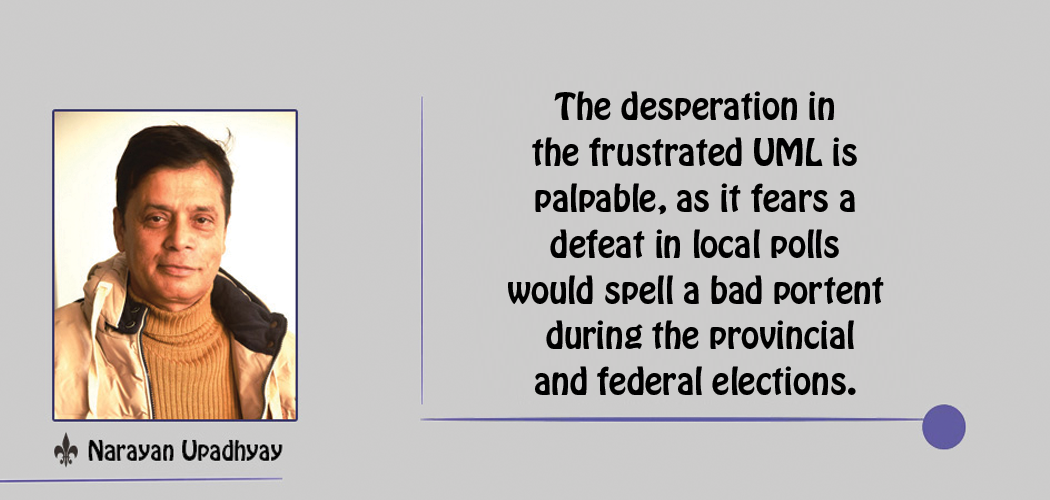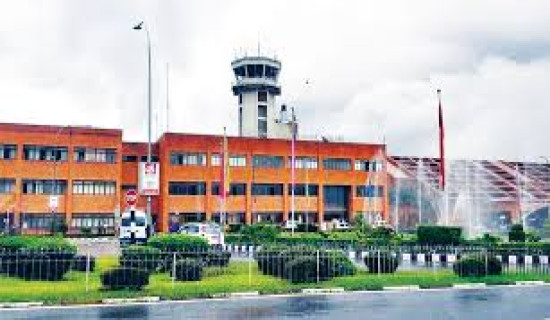- Saturday, 28 February 2026
Alliance Politics: Reaping Dividends
Narayan Upadhyay
With five-party coalition partners firmly in power, alliance politics in the nation appears to stay for years to come. After remaining at the helm for almost a year, the five-party ruling coalition has sensed better times ahead should they preserve their company unbroken. Devising an electoral alliance to contest local elections could push up their chances in provincial and federal parliamentary polls due in six to seven months. While the ruling dispensation has tied a firm bond, the main opposition, the UML, has also allied with some political parties to achieve sound results when the nation goes to the local poll on May 13.
Formation of alliances among political parties to compete in polls has indeed heated Nepali politics. With better results in sight, political parties have found the alliances a convenient way to secure good outcomes in the polls of all kinds. Riding high on the current electoral pact, the Nepali Congress (NC), CPN-Maoist Centre, CPN-Unified Socialist, Janata Samajwadi Party (JSP) and Rastriya Janamorcha believed the contestants picked up by them to contest polls at 753 local units would come out triumphant in ballots. To have stellar performance, they made seating arrangements according to the understanding made at the central and district levels.
Decent chance
A calculation of votes shows that the coalition possesses a decent chance of grabbing most of the seats in metropolises, sub-metropolises, municipalities and rural municipalities as senior leaders have made pleas to voters to cast votes for their candidates. Barring a few places where their rebel candidates and strong UML contenders have filed candidacies, the ruling partners have a better chance of sweeping election results.
Analysts say owing to their sound understanding, the ruling parties possess a strong edge over rival parties. The CPN-UML, which allied with the RPP, former underground outfits like CK Raut's Janamat Party and smaller parties, is likely to experience a notable blow at the hands of the ruling coalition. With their lacklustre voting base, the RPP and Raut's Terai-based party may not create any winning opportunity for the UML-led alliance. The desperation in the frustrated UML is palpable, as it fears a defeat in local polls would spell a bad portent during the provincial and federal elections.
The situation for the opposition in the coming polls got worse because the ruling parties vowed to uphold their alliance at least for the federal polls. If that happens, they will contest provincial and federal votes collectively to scuttle the UML and other parties’ opportunities. Meanwhile, critics termed the current elective alliance as an anti-democratic move. For these critics, the poll pact contravened with the ideologies of competitive multi-party polity and is a step toward an authoritarian regime by keeping their hold in power for long.
These detractors, led by the UML and a few others, have, however, neglected the fact that the communist parties, including the UML and the Maoist Centre, did the ditto during the previous elections. Electoral partnership saw these communist parties winning a sound majority in the provincial and federal parliaments and sweeping results in their favour in the Upper House of parliament. A communist bonhomie during the 2017 election shocked the Nepali Congress to its core after it was relegated to a distant second in parliament. In all seven provinces, the NC could not form a government.
Defeat has taught a lesson to the centrist NC, which later allied even with the ultra-left the Maoists and Madhes-based JSP. The second-largest party in the current parliament and the largest party in the five-party coalition, the NC feels safe that it will have a principal role in polls at every level. The oldest democratic party enjoys an edge, for it has fielded more candidates - 30,000-plus, out of 35,000-plus seats - in local unit elections. It can also field more candidates when coalition collaborators contest all polls jointly winning most seats and allowing it to remain in the leadership role in next governments.
Besides the NC, other coalition partners will benefit. For many, the Maoist Centre may lose votes and seats in elections if it contests the elections single-handedly. After losing votes steadily in every election since they swept the first Constituent Assembly election results in 2008, the former rebels have a poor chance of winning elections on their own. Having gone through several splits, the Janata Samajwadi Party’s prospect of winning considerable seats is negligible. The Unified Socialist, which was formed after breaking up from the UML, and Rastriya Janamorcha, cannot make an impact should they field their candidates separately. The Unified Socialist, however, could dent the UML's votes, causing losses to the party's candidates.
Strong bonding
Contesting elections with electoral alliances is conducive to having better results for every partner, allowing them to remain in power at all levels of government. One should not forget that five parties forged the alliance after main opposition chair KP Sharma Oli pushed them to the wall. He posed threats to their prospects of winning elections if they contested polls separately. The five-party alliance cobbled up to 'save the constitution, democracy and bring political stability' in the nation has become a powerful weapon to defeat rival parties. Oli's malicious move proved a blessing for five parties.
Owing to their strong collaboration and bonding, the five-party coalition will remain in power for long. What is worth noting is the ruling dispensation has so far avoided misunderstanding besetting them, a good sign for them to contest and sweep election outcomes.
(Upadhyay is Managing Editor of this daily.)
















